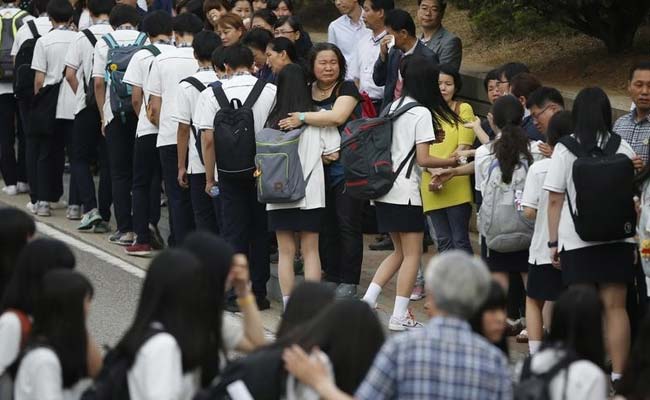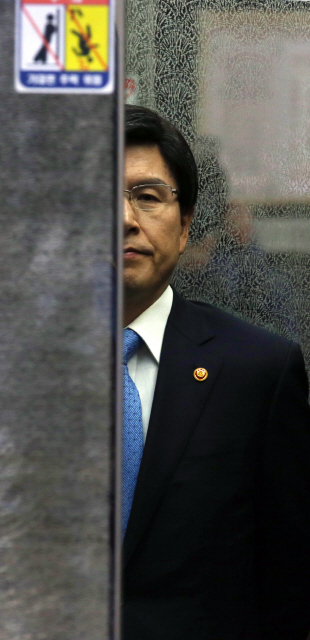SEOUL: South Korean President Park Geun-hye's voice trembled as she tried to comfort parents gathered near a makeshift morgue to identify the bodies of their children, among the hundreds drowned in a ferry disaster.
"I know very well the sorrow of losing a family member because I've experienced it," said Park, whose parents were both killed when she was in her 20s. "My heart aches thinking about how you feel."
It was a rare display of emotion from the usually stoic 62-year-old - too rare, critics say, given the anger and grief that erupted nationwide over the sinking of the Sewol ferry and what was widely seen as a botched rescue operation. About 300 people, most of them school-children, were killed in the disaster last April.
Park is still struggling to reclaim the initiative in Asia's fourth-largest economy. While she has more than three years left in office, South Korean presidents tend to become lame ducks mid-way through their single five-year term, adding urgency for her to lead the country beyond the tragedy.
Park's detached and wary leadership style, which confidants and analysts say seems rooted in her own tragic past in which her father, a former president, and mother were assassinated, has been a handicap in healing a grieving and polarised nation.
"She showed a really good gesture at the very beginning, but afterwards it seemed that she was not there," said Kim Ji-yoon, research fellow and head of the Center for Public Opinion and Quantitative Research at the Asan Institute for Policy Studies.
"She could have been more compassionate. That would help her, but maybe it's not really her style," she said.
Unfortunately for Park, the ferry disaster and the government's response have become the defining events of her term that began in February 2013 after a decisive election win. Her approval rating fell to as low as 40 percent in early July from 59 percent before the disaster, according to Gallup Korea. It recovered somewhat to 44 percent in mid-September.
Kim Jong-in, an economist and former legislator who advised Park during her rise to power and presidential campaign, said the ferry disaster was a missed opportunity to show leadership.
"She should have seen that for what it was, and jumped in to solve the issue, and had she done that, she would not be in this confusion," he said.
Son Sujo, an unsuccessful parliamentary candidate from the city of Busan for whom Park campaigned in 2012, said the president loathes conduct that can be seen as politically calculated, sometimes to her detriment, such as when she did not show more empathy in the days and weeks after the ferry sank.
"What was needed was not for her to resolve the problem instantly but to be there to listen," Son said.
The sinking of the overloaded and structurally unsound Sewol encapsulated some of the worst aspects of South Korea's economic miracle set in motion more than five decades ago by Park's father: corruption, weak regulation, and lax safety standards.
"We were able to see as a result of this incident the need to engage in a thorough renewal of our nation as a whole," Park told Reuters in an interview on Tuesday.
TRUST ISSUESHer immediate challenges are dealing with a coalition of victims' families and supporters demanding an independent prosecutor to investigate the ferry disaster, resolving gridlock in parliament that has stalled other legislation, and expanding a limited pool of close supporters she can turn to for advice and appointments.
The small size of Park's inner circle was exposed when she was unable to replace her prime minister after the Sewol disaster. Two nominees were forced to withdraw from consideration, and she ended up sticking with the incumbent.
"It is probably her biggest weakness - that she likes to establish very close, strong ties with only a few selected people," said Choi Jin, head of the Institute of Presidential Leadership in Seoul.
"It worked when she was a presidential candidate because of security and trust issues. But now, it is a huge problem."
As a school child, Park craved normalcy and tried not to stand out as the president's daughter, one of her teachers said.
"Kids glanced at her lunch box and felt like she was no different from them after finding out she just brought sliced radish kimchi or an anchovy dish," Kim Jae-sook, a nun who taught Park for six years at a Catholic school starting in 1964, told Reuters.
Park cut short her studies in 1974 at the age of 22 when her mother, a beloved figure in South Korea, was killed by a bullet intended for her father. Park returned home from university in Grenoble, France, to take on the role of first lady.
Five years later, her father Park Chung-hee, who came to power in a 1961 military coup and is credited with dragging South Korea out of poverty but at a high cost in human rights, was murdered by his intelligence chief during dinner.
"She's endured and persevered. Some people focus on the aristocratic side of her leadership but I don't interpret it that way. They don't see the scars of Park Geun-hye's suffering, which is what made her quiet and made it difficult for her to talk," said Yang Young-tae, who was the family's dentist when the young Park was first lady and would play tennis with her.
RAGE BROUGHT HER BACK
Notes from Park's diary in a 1993 book speak of the mistrust she felt towards people seeking personal advantage and the sense of betrayal, after her father's assassination, by those whom she had been made to believe were loyal to the family.
"They say words are meant to express one's innermost feelings, but many people that I have dealt with talk to conceal their thoughts," she wrote.
Her entry into politics late in 1997 ended 18 years of seclusion and did not come easily. She anguished "with rage rising from the bottom of my heart" as the country slid towards default during the Asian financial crisis in 1997 before being bailed out by the International Monetary Fund, she wrote in a 2007 autobiography.
She is single, dresses simply and has a 1970s hairstyle that reminds people of her mother, who remains South Korea's most popular first lady, according to opinion polls.
Park is northeast Asia's first female head of state.
She is a rarity in a country where few women rise to the top of big organisations, and where the wage gap between men and women is the widest in the Organisation for Economic Co-operation and Development. North Korea has occasionally hurled sexist insults at her.
While campaigning for another candidate in 2006, a man attacked Park with a knife, gashing her face and leaving a scar.
Park was sweeping about ambitions for her presidency: leave a country that is economically resilient, culturally richer, better prepared for unification with North Korea and safer for everyone, she told Reuters in the interview.
Asked what she learned from her parents, Park cited her father's sense of duty.
"There is not a day when I don't reflect on myself and push myself," she said. "I have this desperate sense of urgency that I have to accomplish what I want to accomplish in the precious time that I have, so I find myself constantly pushing myself."
© Thomson Reuters 2014

























